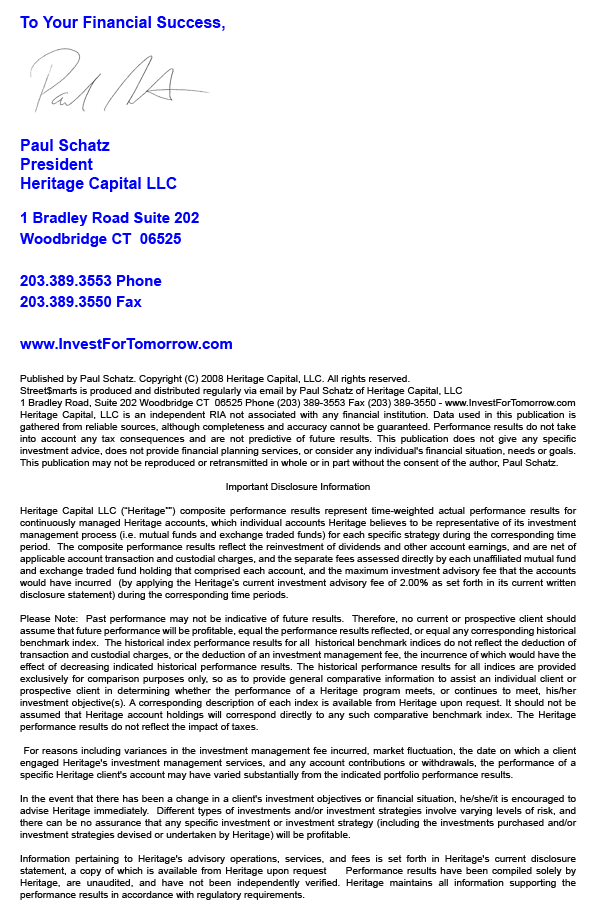2nd Qtr Newsletter – 2019
Too Conservative an Investment Stance Can Also Be Risky
Many investors viewed November and December of 2018 as a precursor of worse things to come. Rather than take a chance on losing more money, they’ve opted to sit out the current market volatility in cash.
But sitting it out can end up costing you far more than being invested. Markets are volatile and investing will always have some element of risk but money that is not invested and earning returns is also at risk. Very few people can afford to retire on just their savings without having those savings earning money. Inflation eats away at the value of a dollar every day. At today’s 12-month average 2.5% inflation rate, $100,000 will lose 39% of its value in 20 years.
Sometimes it helps to step back and think about what investing really is. Investing is very different from speculating. Equity investing is purchasing ownership in a business with the expectation that the business will grow and produce profits, increasing the value of your ownership. Over the short-term, stock markets are not necessarily logical. Share prices will be volatile and may not reflect the value of the company, but rather the emotional reactions of millions of investors to domestic and global news, economics, political factors, and much more. Over the long term, the realities of the company’s performance are more consistently reflected in stock prices.
When you invest in an index, you are investing in the overall market segment the index represents. While an index is less dependent on individual company performance, its long-term prospects will still reflect the growth of the underlying market.
It’s one thing to move to cash when markets are falling, but to stubbornly remain in cash when the market’s trend turns back up needs a better reason than fear of a future loss. For retirees it can be very tempting to not take chances. Cash as a safe harbor is comforting. But without a salary to bring in additional funds, spending principal combined with the impact of inflation can quickly deplete your savings.
Active investment approaches accept that markets are volatile, but strive to turn that volatility into opportunity, taking advantage of the fact that financial markets have historically spent far more time moving up than they have falling. While there is never a guarantee that an investment approach will prove profitable and there is always the potential for loss, by having a plan, one is less likely to sit out rising markets in cash for fear of what the future might bring.
Unless you have all the money you will ever need, you need the income potential investments can offer. Your goal should be to avoid excessive or irrational risks, diversify the risks you do take and stay the course.
Have You Misplaced an Account?
There is more than $100 billion in unclaimed retirement account assets, according to the U.S. Government Accountability Office.
How does $100 billion get lost? A fair amount of it is from minor amounts in 401k plans that employees failed to rollover into an IRA and left behind when changing jobs. Families may be unaware that a deceased member left behind retirement benefits, particularly if the job ended years ago. Company bankruptcies as well as mergers and acquisitions can result in plan terminations. It hasn’t helped that the Social Security Administration and IRS have made it harder for companies to notify former employees by discontinuing tools that plan sponsors found useful to find missing participants.
How do you find misplaced accounts? If the company still exists, start with the Human Resources department. Another resource is https://unclaimed.com/ which lists a number of search databases for unclaimed retirement benefits and other assets. The individual states also maintain their unclaimed property databases. You can even check to see if the SEC owes you money for an enforcement case – http://www.sec.gov/divisions/enforce/claims.htm. Do not, however, agree to pay someone who contacts you with news that they can help you reclaim money for a fee. That is a popular scam.
The Tax Man Cometh
Death and taxes may be inevitable, but death only comes once. Taxes are a daily part of life, particularly each April when the pain of tax return preparation is fresh in our minds. Which makes this a good time to look at how to reduce the tax bite on investment earnings.
- Take advantage of tax deferral on retirement savings by making maximum contributions to tax deferred retirement accounts, such as IRA, 401K, SEP-IRA, 403(b), 457, SARSEP and SIMPLE IRA plans. In most cases, your contribution is tax deductible, and your account grows tax free until withdrawn at retirement. Having your money compounding rather than losing it to tax payments can make a sizeable difference in the growth of your account over time.
- Contribute as much as you can to a Roth IRA (or a Roth 401K) where contributions are after tax, but earnings are tax free when withdrawn in retirement.
- If your investment approach produces lots of short-term gains, you want those funds invested in a retirement account where they can grow tax deferred. Otherwise, you lose a substantial part of your gains each year to taxes and that’s money that will never be able to compound to your benefit.
- Long-term investments may be better off in a taxable account, where you only pay the long-term capital gains tax when positions are sold. If your present income is low enough, you may be able to avoid capital gains taxes altogether (but that could change with the next tax law).
- If you make income from personal interests outside of your normal job, structure your income as a small business to allow you to take business write-offs rather than personal deductions.
- Track your expenses, particularly with respect to long-term improvements to your home. There’s a good chance your gains on the sale of your home will top the personal capital gains exemptions from the sale of a residence ($250,000 individual or $500,000 married), in which case you will need proof of your investments in your home’s value to lower the taxable gain.
- If you are concerned about your heirs having to pay estate taxes, the sooner you work with a qualified estate planner the better. Don’t overlook using your individual annual gift tax exclusion of $15,000 per recipient to move monies out of your estate.
Most important, talk to your financial adviser, accountant or legal adviser on how you can protect income from taxes. Work with an expert to understand the rules and put your plans in place to minimize taxes today and in the future. But take care in doing so that you do not incur tax penalties from improper tax avoidance.

Every dollar you don’t lose to taxes is money that can make you money. Put it to work!
This information is intended as a general overview and is not tax advice. Make certain to consult with a qualified tax adviser to best plan how to minimize your tax burden.
The Tax Bite Takes A Big Part of Some Unusual Gains
Winning the lottery is a windfall not only for the lucky ticket holder but also for state and federal governments. Lottery winnings are taxed as ordinary income and given the size of the pot that may mean the top rates apply.
Buried treasurer, stolen property, Nobel Peace Prizes, gambling winnings, fantasy sports, bartering and definitely any Bitcoin profits are all taxable. If you are selling body parts or are a young woman donating eggs to an infertile couple, any proceeds are considered income.
Received a gift from your employer for recognition of exemplary service or a gift that promotes the company? It’s taxable, unless it is of nominal value, such as a Christmas turkey or ham. Unemployment benefits are taxable. Child support payments are not taxable, but alimony payments are. In fact, the hard part these days is finding a money source that isn’t taxable. Which brings up the money you get from a cash-back credit card or mail-in rebate. The IRS considers those payments as discounts—the equivalent of buying something on sale.
Put Worry to Use Developing Plans
One of the myths of money is that a lot will eliminate your worries. In reality, those with the most savings are often the ones who worry the most. And a primary fear is typically losing or outliving one’s money.
Fear is fine if it is turned to a productive use, but for too many people, fear destroys their quality of life, contributes to illness and wastes time.
“The best way to predict your future is to create it.” (Abraham Lincoln)
There are many potential financial situations that we can’t do anything to prevent, from the Federal Reserve and rising interest rates to inflation, economic recessions, real estate and/or stock market crashes, natural disasters, global conflicts, currency fluctuations, corporate fraud and more. But we can put in place plans to limit the damage and survive, and it starts with identifying your worries and whether they are productive or not.

- Make a list of your worries.
- Take each worry, think about how you can lessen the chance of that worry destroying your financial security and write down your potential solutions.
- If you are worried about running out of money, are there steps you can take to reduce your ongoing expenses? Paying off debt is usually a huge positive because that eliminates an inescapable drain on your finances.
- Are your assets truly diversified or will a major market downturn mean financial disaster?
- Can you position your assets in such a way that the potential for a steady income stream can be realized, perhaps through an annuity, rent payments, dividend and interest income?
- What are your personal resources? What could you do to earn money?
- Given your worries and ways you might be able to counter those worries with the plans above, how threatening really are those concerns in the long run? Can you cope and move on?
In a major disaster, such as a comet strike or volcanic eruption, we are all in deep trouble. There’s little you may be able to do to lessen the impact. But lesser worries often have solutions if we are willing to put together a plan and execute it.
Worried that you will overspend and run out of money? Put together a budget so you know what you spend each month, on what, whether you need to cut back on spending and if so where. If your budget shows you have plenty of money, enjoy it. Don’t let worry make you afraid to spend money and find pleasure in your activities. Just know what you can and can’t afford.
Fretting that your home is vulnerable to fire and you could lose family treasures? Make certain your insurance will cover the loss, place treasured objects in safe deposit boxes or storage in a safer location or sell your home and move to a safer neighborhood.
Concerned that you could get ill and medical bills could mean bankruptcy? To the degree possible make certain you have good medical insurance coverage. Then move your assets out of reach of creditor claims as much as possible. The caution is that you have to plan and put these actions in place when you are healthy or your creditors may have the right to claw back assets. And you need to make certain you don’t endanger your assets through unwise or illegal solutions. Double check the advice you receive. Research your options and the precautions you need to take.
If you are worried that financial losses will make your life uncomfortable, practice discomfort. Find out if it really is that destructive to your life, or if you can live with the discomfort. The goal is to take away some of the fear that a worry might come true.
Anxiety or worry is all about anticipation. The ‘what ifs’ are built up in one’s mind until they appear much worse than how you may feel if your worry really happens. In some ways, worriers can be better at handling problems (particularly since reality is rarely as bad as you imagine) because they have already rehearsed their responses in their minds. The problem is when worrying takes away from quality of life.
There may be worries that you just need to accept and embrace uncertainty. As long as you feel like you have done what you can to counter those worries, you have to let go. Life will be what it will be.
Before you let worries destroy your life, make an appointment to go over your finances with us. Let’s take a hard look at your life style and your funds and put together a plan that keeps worries under control and lets you enjoy life.
Money Madness – Those Irrational Money Behaviors

Behavioral finance is one of the hot topics of the day. It’s all about why people make poor financial decisions. Before you consider it all “bunk” and ignore the conversation, take a look at how marketers are putting that same knowledge to work.
1. Why wine menus always have a few mega buck bottles.
The expensive bottle makes the mid-tier bottles seem cheaper in comparison. Much the same happens in auto sales, appliances, home sales, etc. If your purchase is framed by more expensive options, it seems more reasonably priced, even if it is far more than we intended to pay. By anchoring our expectations of price with the higher option, the lower amount no longer seems too much to spend.
2. Thinking it isn’t really a loss until it’s final.
Loss aversion makes us reluctant to sell a bad position in hopes that it will go back up. It makes us keep an expensive gadget that we don’t use or clothing that no longer fits. It’s why we don’t cancel memberships we don’t use because we view that sunk cost as still potentially redeemable. Health clubs are well aware that once they get that initial membership payment, it’s hard for people to cancel their unused memberships.
3. Placing a high value on FREE.
Have you ordered one more item than you wanted on Amazon to get free shipping or bought a product to get the free gift set? We tend to be suckers for “free,” not looking at how much we spend just to get something for free. Has a hotel chain called you recently to let you know you have been awarded a “free” stay. That free stay is far from free by the time you factor in travel, food and entertainment costs, to say nothing of potentially sitting through a time share pitch. But it’s hard to turn down the idea of a freebie theoretically worth a couple hundred dollars.
4. Present wants are more important than future needs.
Yeah, yeah, we know we need to put money aside for retirement, that we should have an emergency fund and that unless we accumulate a down payment that new home will never be ours. But that’s far away and we have a “good use” for the money now. Marketing plays on our desire for immediate gratification and our unconscious feeling that now matters more than later.
5. Overestimating the possibility of unlikely things occurring.
Lotteries love promotion of big winners. If we can think of examples of people who have won the lottery, hit it big in Las Vegas, made the ultimate stock trade, or started a hot company, we think the same is more likely to happen to us, regardless of the odds against that occurring. In the gambler’s fallacy, people believe that something is “due” to happen simply because it hasn’t for quite some time.
Before you dismiss behavioral finance as something that doesn’t apply to you, it pays to think about the money choices we make and why we make irrational choices. If an investment turns sour, the logical decision is to sell it and invest the money in a more likely prospect. As much as you might like to win the lottery, counting on winning to fund your retirement is not logical. You are not more likely to make a lucky bet just because you have lost your money up to that point. Understanding why we make irrational decisions really does help reset our brains to make more rational decisions and that can add up to real money!


